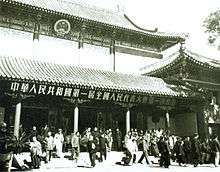Politburo of the Communist Party of China
The Central Politburo of the Communist Party of China, formally known as the Political Bureau of the CPC Central Committee and known as Central Bureau before 1927, is a group of 25 people who oversee the Communist Party of China. Unlike politburos (political bureaus) of other Communist parties, power within the politburo is centralized in the Politburo Standing Committee, a smaller group of Politburo members.
Political Bureau of the Chinese Communist Party Central Committee 中国共产党中央政治局 | |
|---|---|
 | |
| Leadership | |
Status | Executive CPC body between the Standing Committee and Central Committee, Communist Party of China |
Leader of the Party | Xi Jinping, General Secretary |
1st-ranked member | |
Elected by | the Central Committee |
Responsible to | the Central Committee |
| Seats | 25 |
| Meeting place | |
 | |
| Huairen Hall, Zhongnanhai Beijing, China[1] | |
| Politburo of the Communist Party of China | |||||||
|---|---|---|---|---|---|---|---|
| Simplified Chinese | 中国共产党中央政治局 | ||||||
| Traditional Chinese | 中國共產黨中央政治局 | ||||||
| Literal meaning | China Communist Party Central Political Bureau | ||||||
| |||||||
| Politburo | |||||||
| Chinese | 政治局 | ||||||
| Literal meaning | Political Bureau | ||||||
| |||||||
The Politburo is nominally elected by the Central Committee. In practice, however, scholars of Chinese elite politics believe that the Politburo is a self-perpetuating body, with new members of both the Politburo and its Standing Committee chosen through a series of deliberations by current Politburo members and retired Politburo Standing Committee members. The current and former Politburo members conduct a series of informal straw polls to determine the group's level of support for each new candidate's membership in the Politburo. The process for selecting the new Politburo begins with a closed door meeting by the incumbent Politburo Standing Committee in Beidaihe in the summer before the Party Congress convenes.[2][3]
The power of the Politburo resides largely in the fact that its members generally simultaneously hold positions within the People's Republic of China state positions and with the control over personnel appointments that the Politburo and Secretariat have. In addition, some Politburo members hold powerful regional positions. How the Politburo works internally is unclear, but it appears that the full Politburo meets once a month and the standing committee meets weekly. This is believed to be much more infrequent than the former Soviet Politburo had met. The agenda for the meetings appears to be controlled by the General Secretary and decisions are made by consensus rather than by majority vote.[4]
The Politburo was eclipsed by the Secretariat of the Communist Party of China Central Committee in the early 1980s under Hu Yaobang,[5] but has re-emerged as a dominant force after Hu's ousting in 1987.
Current Politburo
The 19th Politburo was elected at the first plenary session of the 19th Central Committee in October 2017.
| Hanzi | Name | Year of birth | K | Office(s) |
|---|---|---|---|---|
| 习近平 | Xi Jinping | 1953 |
— |
General Secretary of the Communist Party of China President of the People's Republic of China Chairman of the Central Military Commission |
| 李克强 | Li Keqiang | 1955 |
— |
Premier of the State Council |
| 栗战书 | Li Zhanshu | 1950 |
— |
Chairman of the National People's Congress Standing Committee |
| 汪洋 | Wang Yang | 1955 |
— |
Chairman of the National Committee of the Chinese People's Political Consultative Conference |
| 王沪宁 | Wang Huning | 1955 |
— |
Secretary of the Central Secretariat (first-ranked) |
| 赵乐际 | Zhao Leji | 1957 |
— |
Secretary of the Central Commission for Discipline Inspection |
| 韩正 | Han Zheng | 1954 |
— |
Vice Premier of the State Council (first-ranked) |
| 丁薛祥 | Ding Xuexiang | 1962 |
— |
Director of the General Office |
| 王晨 | Wang Chen | 1950 |
— |
Vice Chairman of the Standing Committee of the National People's Congress |
| 刘鹤 | Liu He | 1952 |
— |
Vice Premier of the State Council |
| 许其亮 | Xu Qiliang | 1950 |
§ | Vice Chairman of the Central Military Commission |
| 孙春兰 | Sun Chunlan | 1950 |
♀ | Vice Premier of the State Council |
| 李希 | Li Xi | 1956 |
— |
Party Secretary of Guangdong |
| 李强 | Li Qiang | 1959 |
— |
Party Secretary of Shanghai |
| 李鸿忠 | Li Hongzhong | 1956 |
— |
Party Secretary of Tianjin |
| 胡春华 | Hu Chunhua | 1963 |
— |
Vice Premier of the State Council |
| 杨洁篪 | Yang Jiechi | 1950 |
— |
Director of the Office of Foreign Affairs |
| 杨晓渡 | Yang Xiaodu | 1953 |
— |
Director of the National Supervisory Commission |
| 张又侠 | Zhang Youxia | 1950 |
§ | Vice Chairman of the Central Military Commission |
| 陈希 | Chen Xi | 1953 |
— |
Head of the Organization Department |
| 陈全国 | Chen Quanguo | 1955 |
— |
Party Secretary of the Xinjiang Uyghur Autonomous Region |
| 陈敏尔 | Chen Min'er | 1960 |
— |
Party Secretary of Chongqing |
| 郭声琨 | Guo Shengkun | 1954 |
— |
Secretary of the Political and Legal Affairs Commission |
| 黄坤明 | Huang Kunming | 1956 |
— |
Head of the Propaganda Department |
| 蔡奇 | Cai Qi | 1955 |
— |
Party Secretary of Beijing |
- Keys
| Abbreviations | |
|---|---|
| IDUCC | Institutions Directly Under the Central Committee |
| K | Keys |
| CIM | Central institution membership, which in this instance means membership in the PSC, PB, ST and CMC |
| PSC | Standing Committee of the Political Bureau |
| PB | Political Bureau |
| ST | Secretariat |
| CMC | Central Military Commission |
| SC–CCDI | Standing Committee of the Central Commission for Discipline Inspection |
| CCDI | Central Commission for Discipline Inspection |
| CPPCC | Chinese People's Political Consultative Conference |
| NL | National Leader |
| DNL | Deputy National Leader |
| PM | Provincial-Ministerial |
| SPM | Sub-provincial (vice-ministerial) |
| DE | Department-prefecture level |
| Adm. | Admiral |
| V-Adm. | Vice-Admiral |
| Gen. | General |
| Lt. Gen. | Lieutenant General |
| Maj. Gen. | Major General |
| Keys | |
| ♀ | Indicates that the individual is female. |
| ↑ | Indicates that the individual was elevated from alternate to full member |
| ♮ | Indicates that the individual was expelled from the Communist Party after CCDI investigation. |
| ₪ | Indicates that the individual is currently under investigation by the CCDI. |
| ∞ | Indicates that the individual is retired from active political positions[note 1] |
| § | Indicates that the individual is military personnel. |
| ↔ | Indicates that the individual is military personnel and has retired from active military service. |
| Note | If two keys are used in the same column it indicates that the individual is both of something. For instance, "♀§" indicates that the individual is female (♀) and military personnel (§). |
Notes
- "Active" political positions refer to the offices of Governor and provincial-level Party Secretary; often, an individual is considered retired when they relinquish either of those offices due to age, and are assigned some kind of committee membership in the National People's Congress.
References
- Wang, Jun (15 June 2013). "中央政治局如何开会". qikan.com. Retrieved 18 October 2017.
- Li, Cheng (2016). Chinese Politics in the Xi Jinping Era: Reassessing Collective Leadership. Brookings Institution Press. ISBN 9780815726937. Retrieved 18 October 2017.
- Kang Lim, Benjamin (20 November 2017). "Exclusive: China's backroom powerbrokers block reform candidates - sources". Reuters. Retrieved 18 October 2017.
- Miller, H. "Hu Jintao and the Party Politburo" (PDF). China Leadership Monitor. Hoover Institution. p. 5. Retrieved 15 October 2011.
- Li, Cheng et al. (2008). China's Changing Political Landscape, Washington: Brookings Institution Press. ISBN 978-0-8157-5209-7.
External links
- "Hu Jintao and the Party Politburo", Winter 2004: Party Affairs, By Alice L. Miller, China Leadership Monitor No. 9
- www.nodulo.org Pictures of the members (Spanish)
See also
- 19th Politburo of the Communist Party of China
- Collective leadership
- Central Committee of the Communist Party of China
- Politburo Standing Committee of the Communist Party of China
- General Secretary
- Central Secretariat
- General Office
- Central Security Bureau
- Central Guard Unit
- Central Security Bureau
- Politburo Standing Committee of the Communist Party of China
.svg.png)
